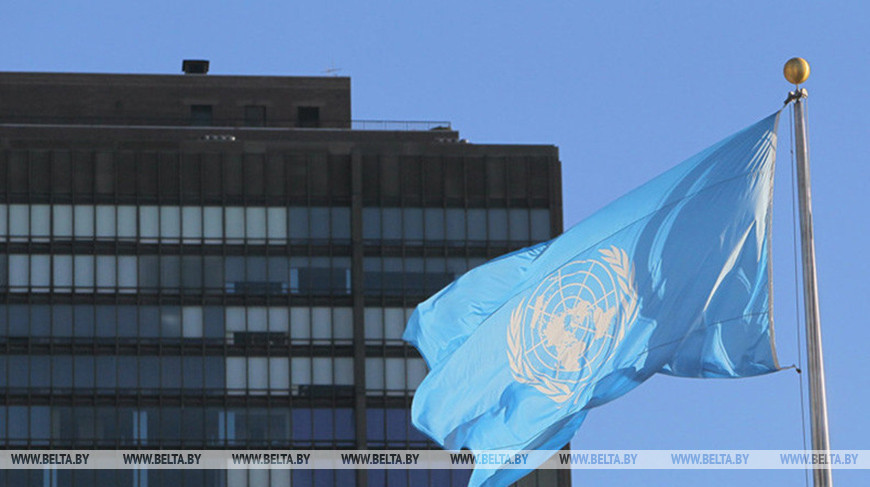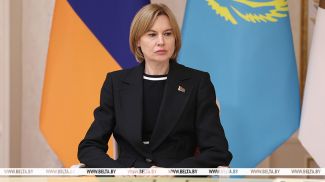
MINSK, 13 February (BelTA) - The problem of sanctions must be given due attention and an unbiased
assessment, Belarus’ Permanent Representative to the UN Office in Geneva
Larisa Belskaya said as she addressed the 75th executive session of the
Trade and Development Board of UNCTAD, BelTA learned from the press
service of the Ministry of Foreign Affairs.
The diplomat thanked the UNCTAD Secretariat for the flagship report on trade and development in 2023. "We share the findings of the report that the record-high rise in global food prices has a significant detrimental impact on developing countries," she said. "We are concerned about the number of food-insecure people in developing countries that doubled over 2020 and the pessimistic outlook for 2024."
In her opinion, the report by the UN Global Crisis Response Group, according to which world food prices approached historical highs even before the start of the war in Ukraine, merits attention: "Notably, food prices remain at historically high end of 2021 levels, with global commodity prices generally declining recently." In a number of developing countries, domestic prices for staple foods in June 2023 remained above 2022 levels and continued to have an impact on food security.
Ambassador Larisa Belskaya believes that the authors of the report quite rightly attribute high fertilizer costs to the factors that keep food prices high. In the 2022 edition of The State of Food Security and Nutrition in the World (SOFI), the FAO and a number of UN agencies, including the World Food Programme, the International Fund for Agricultural Development, WHO, UNDP, UNICEF, also concluded that "the sharp rise in fertilizer prices caused by the sanctions is reducing the economic availability of food."
"Today, the economic and physical availability of potash fertilizers continues to be a major concern, especially for low-income countries. Another aspect of this problem is unfair competition and speculation, which also get significant attention in the UNCTAD report,” the diplomat said. "Shortages cause increases in prices and costs for farmers, which affects yields and drives food prices even higher."
"Thus, keeping the Western sanctions against Belarusian fertilizers in place, blocking their unimpeded transit to foreign markets are among the critical factors contributing to the threat of hunger in vulnerable countries and to the growing global food crisis," she stressed.
Speaking about sanctions in general, Larisa Belskaya remarked that unilateral coercive measures in economic and financial sectors take a wrecking ball to international trade and development, hurt vital economic sectors. “Sanctions exacerbate monopolization of markets; they aggravate shortages of raw materials, food, medical supplies and industrial goods, hitting consumers and economy as a whole. Product shortages create an enabling environment for shadow trade; shadow traders and intermediaries further inflate prices,” she stated. “Excessive compliance requirements by banks, insurers, businesses regardless of whether they are located in the sanctioning state or elsewhere, are disrupting supply chains for critical goods, medicines and food that are meant for those most in need."
Industry-specific and comprehensive sanctions cannot but affect the most vulnerable population groups who depend on government support more than anyone, said the permanent representative of Belarus. She cited Cuba, Iran, Venezuela, Syria, and Belarus as examples. "Tomorrow this list may be expanded to include other countries that are in the West’s bad books. In fact, financial and economic sanctions imposed by Western countries are a political problem. They are instrumentalized to assert one’s power and put pressure in international relations. They undermine the Spirit of Speightstown and the Bridgetown Covenant by aggravating inequality and vulnerability,” Larisa Belskaya emphasized.
Belarus is fully aware of the political sensitivity of this topic. “We strongly urge UNCTAD to pay due attention to this problem and study the impact of sanctions on inclusive, sustainable and resilient development, make an unbiased assessment of their repercussions, and offer appropriate recommendations,” she said. “We strongly believe that this global economic trend should remain in the focus of attention of UNCTAD in accordance with the functions assigned to it by UN General Assembly resolution 1995 (XIX) and the Bridgetown Covenant. For its part, Belarus will fully support the efforts of the UNCTAD leadership and member states to address this issue and to fulfil large-scale tasks of the global economic agenda,” the diplomat added.
The diplomat thanked the UNCTAD Secretariat for the flagship report on trade and development in 2023. "We share the findings of the report that the record-high rise in global food prices has a significant detrimental impact on developing countries," she said. "We are concerned about the number of food-insecure people in developing countries that doubled over 2020 and the pessimistic outlook for 2024."
In her opinion, the report by the UN Global Crisis Response Group, according to which world food prices approached historical highs even before the start of the war in Ukraine, merits attention: "Notably, food prices remain at historically high end of 2021 levels, with global commodity prices generally declining recently." In a number of developing countries, domestic prices for staple foods in June 2023 remained above 2022 levels and continued to have an impact on food security.
Ambassador Larisa Belskaya believes that the authors of the report quite rightly attribute high fertilizer costs to the factors that keep food prices high. In the 2022 edition of The State of Food Security and Nutrition in the World (SOFI), the FAO and a number of UN agencies, including the World Food Programme, the International Fund for Agricultural Development, WHO, UNDP, UNICEF, also concluded that "the sharp rise in fertilizer prices caused by the sanctions is reducing the economic availability of food."
"Today, the economic and physical availability of potash fertilizers continues to be a major concern, especially for low-income countries. Another aspect of this problem is unfair competition and speculation, which also get significant attention in the UNCTAD report,” the diplomat said. "Shortages cause increases in prices and costs for farmers, which affects yields and drives food prices even higher."
"Thus, keeping the Western sanctions against Belarusian fertilizers in place, blocking their unimpeded transit to foreign markets are among the critical factors contributing to the threat of hunger in vulnerable countries and to the growing global food crisis," she stressed.
Speaking about sanctions in general, Larisa Belskaya remarked that unilateral coercive measures in economic and financial sectors take a wrecking ball to international trade and development, hurt vital economic sectors. “Sanctions exacerbate monopolization of markets; they aggravate shortages of raw materials, food, medical supplies and industrial goods, hitting consumers and economy as a whole. Product shortages create an enabling environment for shadow trade; shadow traders and intermediaries further inflate prices,” she stated. “Excessive compliance requirements by banks, insurers, businesses regardless of whether they are located in the sanctioning state or elsewhere, are disrupting supply chains for critical goods, medicines and food that are meant for those most in need."
Industry-specific and comprehensive sanctions cannot but affect the most vulnerable population groups who depend on government support more than anyone, said the permanent representative of Belarus. She cited Cuba, Iran, Venezuela, Syria, and Belarus as examples. "Tomorrow this list may be expanded to include other countries that are in the West’s bad books. In fact, financial and economic sanctions imposed by Western countries are a political problem. They are instrumentalized to assert one’s power and put pressure in international relations. They undermine the Spirit of Speightstown and the Bridgetown Covenant by aggravating inequality and vulnerability,” Larisa Belskaya emphasized.
Belarus is fully aware of the political sensitivity of this topic. “We strongly urge UNCTAD to pay due attention to this problem and study the impact of sanctions on inclusive, sustainable and resilient development, make an unbiased assessment of their repercussions, and offer appropriate recommendations,” she said. “We strongly believe that this global economic trend should remain in the focus of attention of UNCTAD in accordance with the functions assigned to it by UN General Assembly resolution 1995 (XIX) and the Bridgetown Covenant. For its part, Belarus will fully support the efforts of the UNCTAD leadership and member states to address this issue and to fulfil large-scale tasks of the global economic agenda,” the diplomat added.













